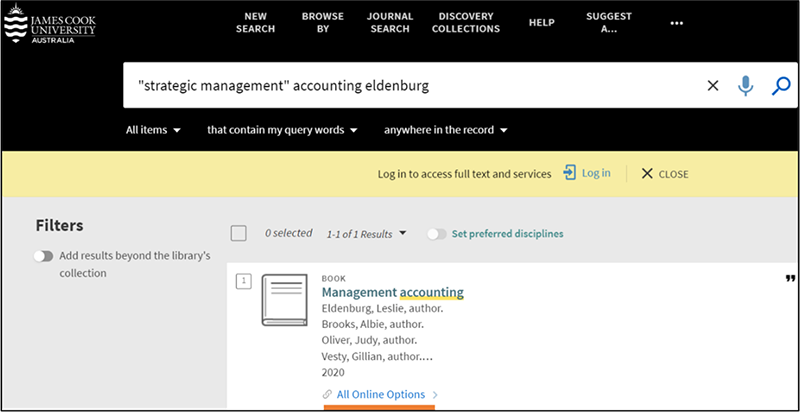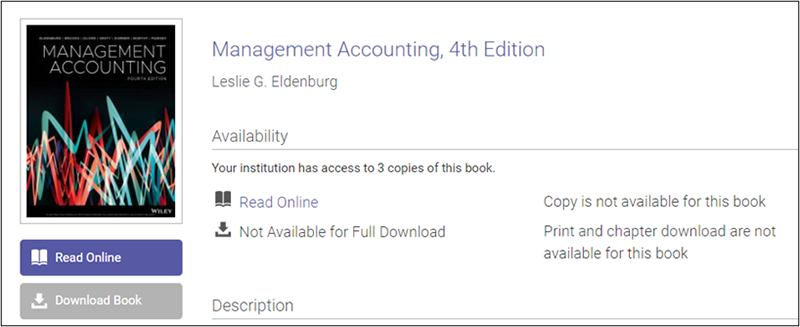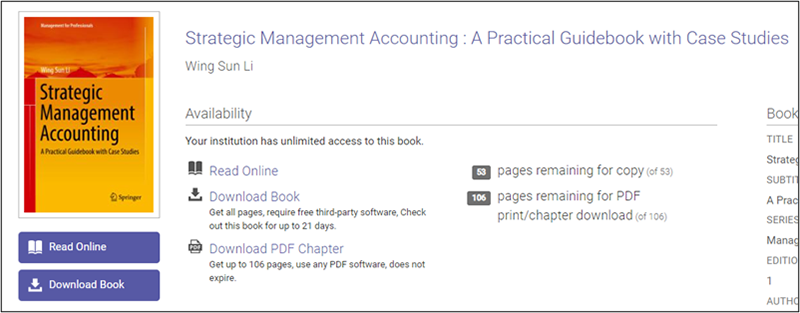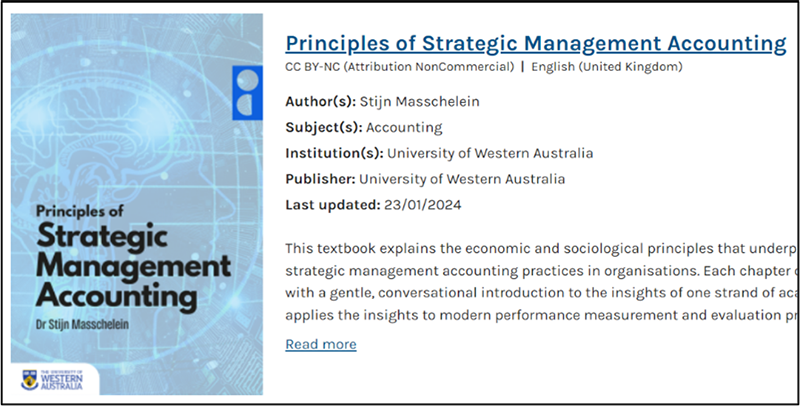How to identify zero cost to students flexibly-licensed textbooks
- Future Students
- JCU Global Experience
- International Students
- Open Day
- How to apply
- Pathways to university
- Virtual Open Day
- Living on Campus
- Courses
- Publications
- Scholarships
- Parents and Partners
- JCU Heroes Programs
- Aboriginal and Torres Strait Islander in Marine Science
- Elite Athletes
- Defence
- Current Students
- New students
- JCU Orientation
- LearnJCU
- Placements
- CEE
- Unicare Centre and Unicampus Kids
- Graduation
- Off-Campus Students
- JCU Job Ready
- Safety and Wellbeing
- JCU Prizes
- Professional Experience Placement
- Employability Edge
- Art of Academic Writing
- Art of Academic Editing
- Careers and Employability
- Student Equity and Wellbeing
- Career Ready Plan
- Careers at JCU
- Partners and Community
- JCU-CSIRO Partnership
- Alumni
- About JCU
- Reputation and Experience
- Chancellery
- Governance
- Celebrating 50 Years
- Academy
- Indigenous Engagement
- Education Division
- Graduate Research School
- Research and Teaching
- Research Division
- Research and Innovation Services
- CASE
- College of Business, Law and Governance
- College of Healthcare Sciences
- College of Medicine and Dentistry
- College of Science and Engineering
- CPHMVS
- Anthropological Laboratory for Tropical Audiovisual Research (ALTAR)
- Anton Breinl Research Centre
- Agriculture Technology and Adoption Centre (AgTAC)
- Advanced Analytical Centre
- AMHHEC
- Aquaculture Solutions
- AusAsian Mental Health Research Group
- ARCSTA
- Area 61
- Lions Marine Research Trust
- Australian Tropical Herbarium
- Australian Quantum & Classical Transport Physics Group
- Boating and Diving
- Clinical Psychedelic Research Lab
- Centre for Tropical Biosecurity
- Centre for Tropical Bioinformatics and Molecular Biology
- CITBA
- CMT
- Centre for Disaster Solutions
- CSTFA
- Cyclone Testing Station
- The Centre for Disaster Studies
- Daintree Rainforest Observatory
- Fletcherview
- JCU Eduquarium
- JCU Turtle Health Research
- Language and Culture Research Centre
- MARF
- Orpheus
- TESS
- JCU Ideas Lab
- TARL
- eResearch
- Indigenous Education and Research Centre
- Estate
- Work Health and Safety
- Staff
- Discover Nature at JCU
- Cyber Security Hub
- Association of Australian University Secretaries
- Services and Resources Division
- Environmental Research Complex [ERC]
- Foundation for Australian Literary Studies
- Gender Equity Action and Research
- Give to JCU
- Indigenous Legal Needs Project
- Inherent Requirements
- IsoTropics Geochemistry Lab
- IT Services
- JCU Webinars
- JCU Events
- JCU Motorsports
- JCU Sport
-
Library
- Find
- Learn
- Services
- I am a
- Special Collections
- About
- A-Z
- Mabo Decision: 30 years on
- Marine Geophysics Laboratory
- Office of the Vice Chancellor and President
- Outstanding Alumni
- Pharmacy Full Scope
- Planning for your future
- Policy
- PAHL
- Queensland Research Centre for Peripheral Vascular Disease
- Rapid Assessment Unit
- RDIM
- Researcher Development Portal
- Roderick Centre for Australian Literature and Creative Writing
- Contextual Science for Tropical Coastal Ecosystems
- State of the Tropics
- Strategic Procurement
- Student profiles
- SWIRLnet
- TREAD
- TropEco for Staff and Students
- TQ Maths Hub
- TUDLab
- VAVS Home
- WHOCC for Vector-borne & NTDs
- Media
- Copyright and Terms of Use
- Australian Institute of Tropical Health & Medicine
- Pay review
Overview
If a prescribed textbook is set, it is important to ensure students have satisfactory access to it from day one. This guide will help teaching staff understand licence conditions for eTextbooks held in JCU Library collections. It also provides information on the benefits of using open educational resources (OERs) as alternatives to traditional published textbooks. Opting for either choice for a subject's learning materials ensures students will enjoy a zero textbook cost (ZTC) experience within that subject.
Common eTextbook misunderstandings
Academics are encouraged to request books and eTextbooks for JCU Library collections. However, please keep in mind that academic textbook publishing limitations can be frustrating. Publishers may not offer your preferred textbook as an eTextbook, or an eTextbook may be available for individual purchase but not library purchase.
Please connect with Library staff if you have concerns.
JCU Library subscribed eTextbooks
Where possible, JCU Library aims to subscribe to eTextbook copies of prescribed texts (see JCU Library Prescribed and Recommended Textbook Guidelines). However, these eTextbooks come with licensing conditions that may restrict concurrent usage, downloads, copying, printing and access to supplementary materials. Restrictive licensing conditions could affect student access, especially during peak usage periods, such as in the lead up to an assignment task due date. By connecting with library staff in the early stages of curriculum planning or refresh projects we can assist with identifying a prescribed textbook that has satisfactory availability and access conditions. Library services will then arrange eText acquisition when you have chosen your preferred text.
Searching for eBooks and eTextbooks
Search One Search using a book’s title and an author’s surname. Search with keywords if you don’t have a specific textbook in mind. Phrase searching using double quotation marks “ ” will stick words together.
If you like a book, click ‘All Online Options’ (underlined below) to view its Library catalogue record
.
Next go to the ‘View Now’ heading. The underlined section provides basic information on user access. Click the provider link (in this example, ProQuest Ebook Central) to go to the book.

This screen shows complete information on limitations of use for the book. Only three users can access the book at the same time, and copying, printing and downloads are not available. This limited licence is not ideal, the library may be able to negotiate a better licence. If not, you could consider an alternative text with better licence conditions. Connect with Library staff to discuss your options.

Here’s another potential eTextbook. This text allows for unlimited user access. It also offers each user some copying, printing and download functionality. (These limits often reset after 24 hours.)

Typical use limits
- Full downloads or loans: The Library will generally limit prescribed eTextbooks to not allow full downloads or loans to maximise student access. This means an eTextbook is only available to read online or for chapter download.
- Unlimited: There is no cap on the number of users who can access the text at the same time.
- 1 or 3 user licenses: Use is limited to only 1 or 3 users at the same time. These are often restricted to read-online only access (or chapter downloads) to prevent books being locked for extended periods.
- Concurrent or non-linear licences: There is no cap on the number of users at the same time, but with a limited number of uses per year (usually 200-325). Use is then closed, however, if they expire before the subscription anniversary, the Library may purchase additional access.
- Printing, copying and download limits: Individual titles will have different settings, it is important to consider whether these will suit your students needs.
Open educational resources (OERs)
OERs offer many benefits for learning and teaching. OERs usually:
- Are peer-reviewed and/or are considered high-quality learning resources
- Are compliant with principles of universal design for learning (UDL) maximising accessibility for all students
- Are openly licensed so that texts can be adapted to showcase the latest information, local contexts and/or inclusive exemplars and language
- Can be downloaded in their entirety so that students without the internet can use them at home
- Offer unlimited simultaneous usage, copying, printing and download functionality.
OER example
Principles of Strategic Management Accounting

Book features:
- Read it online or download it in different formats
- Peer-review statement
- Accessibility information
- 39,214 words
- Has been adapted for an Australian audience
Learn more about OERs and how to find them from JCU Library’s Open Education Resources (OER) Guide.
Open Education Resources Discovery Collection
Explore our collection of Open eBooks that are available for adoption for subject disciplines taught at JCU, curated by our JCU librarians for your convenience.
Connect with Library staff if you would like assistance identifying suitable OERs for your subjects.